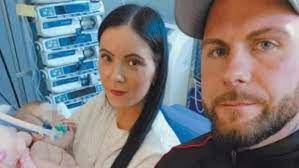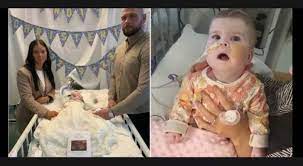Italy grants citizenship to a terminally ill baby after UK doctors refused to keep her on life support

Rome: Italy has granted citizenship to an 8-month-old British baby, Indi Gregory, who is suffering from a serious and probably terminal mitochondrial disease.
A judge in London ruled in favour of removing her from life support at Queen’s Medical Centre, in Nottingham, against the wishes of her parents. He accepted evidence from the doctors that “that the burdens of invasive treatment outweigh the benefits”.
Indi’s parents hope that the Italian government’s decision will add weight to their fight to allow her to be transferred to Italy where she can be treated at the Vatican’s paediatric hospital, Bambino Gesu, in Rome.
However, the judge ruled on October 31: “there is nothing to suggest that IG’s prognosis would be beneficially altered by the Italian hospital’s treatment. On the contrary, it may well prolong pain and suffering if and to the extent that it incorporates invasive procedures which in my judgment are not in IG’s best interests, and should not be sanctioned.”
Indi’s father, Dean Gregory, told the media that: “The doctors painted a terribly bleak and negative picture of Indi’s condition during court proceedings. Indi can definitely experience happiness. She cries like a normal baby. We know she is disabled, but you don’t just let disabled people die. We just want to give her a chance.”
Italian Prime Minister Giorgia Meloni said: “They say there isn’t much hope for little Indi, but until the very end, I’ll do what I can to defend her life, and to defend the right of her mamma and papa to do all that they can for her.”
There have been several cases like this in the UK recently, in which doctors want to withdraw treatment from a disabled baby against the parents’ wishes.
An Italian-based online magazine, the New Daily Compass, interviewed Dean Gregory to get his side of the story:

He claims that it is a one-sided system: “The NHS, the lawyers, the doctors all back each other up, they behave like mates and even eat lunch together. The family doesn’t stand a chance and has no rights. I was shocked by the exaggerated testimonies the professionals gave in court trying to prove Indi is in terrible pain.”
He felt that the doctors were upset by Italy’s decision: “It seemed like their reputations were at stake and they couldn’t allow a precedent which might encourage others to follow suit so they had to punish us … They said it was prolonging the inevitable because the illness cannot be cured. It’s true, I know there is no cure, I also know the illness can be managed as happens with diabetes or asthma for which there is no cure. But, if you kill all the patients with the illness, how will doctors ever find a cure?”
Surprisingly, the hospital’s attitude convinced him to be baptised: “I am not religious and I am not baptised. But when I was in court, it felt like I had been dragged to hell. I thought if hell exists then heaven must exist. It was like the devil was there. I thought if there’s a devil then God must exist … I have seen what hell is like and I want Indi to go to heaven. In fact, I have decided that me and my daughter should get baptised too.”
Andrea Williams, the CEO of Christian Concern, a legal firm which acted for Indi’s parents, expressed her exasperation with the judge’s decision. “It is deeply shocking to see judges rule, time after time, that it is in someone’s ‘best interests’ to die. No one knows for sure what will happen to Indi if treatment is continued. It may be unsuccessful. Equally, the skill of doctors in Italy, experimental trials and treatments or the miraculous intervention of God may give Indi much longer, and some quality of life.”
However, the Catholic Bishops Conference of England and Wales was non-committal about Indi’s plight. They simply insisted on maintaining basic care in the face of inevitable death.





